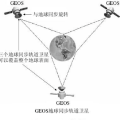We propose a novel data-driven approach to allocate transmit power for federated learning (FL) over interference-limited wireless networks. The proposed method is useful in challenging scenarios where the wireless channel is changing during the FL training process and when the training data are not independent and identically distributed (non-i.i.d.) on the local devices. Intuitively, the power policy is designed to optimize the information received at the server end during the FL process under communication constraints. Ultimately, our goal is to improve the accuracy and efficiency of the global FL model being trained. The proposed power allocation policy is parameterized using a graph convolutional network and the associated constrained optimization problem is solved through a primal-dual (PD) algorithm. Theoretically, we show that the formulated problem has zero duality gap and, once the power policy is parameterized, optimality depends on how expressive this parameterization is. Numerically, we demonstrate that the proposed method outperforms existing baselines under different wireless channel settings and varying degrees of data heterogeneity.
翻译:我们提出了一种新的数据驱动方法,用于在干扰受限的无线网络上分配联邦学习(FL)传输功率。该方法在训练过程中无线信道发生变化且本地设备上的训练数据不是独立同分布的(非i.i.d)的具有挑战性的场景中非常有用。本文提出的功率策略旨在在通信约束下优化FL过程中服务器端收到的信息。我们的最终目标是提高全局FL模型的准确性和效率。所提出的功率分配策略使用图卷积网络进行参数化,并通过原始双重(PD)算法解决相关约束优化问题。在理论上,我们证明所制定的问题具有零对偶缺口,一旦确定功率策略的参数化,优化就取决于这种参数化的表达能力。在数值上,我们演示了所提出的方法在不同的无线信道设置和不同程度的数据异构性下优于现有基线。



